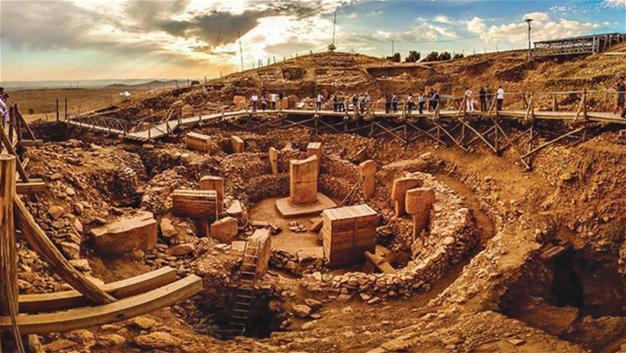Few realize that Turkey has a long record of major geophysical upheaval and mysterious disappearances of entire communities.
In one fifty-year period, from 1225 B.C. to 1175 B.C., at least 47 cities around the Mediterranean fell to earthquakes, with substantial destruction in Greece and Turkey.
In Israel, where Solomon bowed before strange gods (and where children were sacrificed to a god called Molech), huge marble pillars were knocked on their sides and men buried beneath them.
Some believe it may even have been one massive quake of earth-rattling proportion.
“There were truly major events,” said Amos Nur, a geophysicist at Stanford University. “Whether it’s a global [seismic] storm or a regional storm needs to be sorted out.”
Structures built to honor demon gods collapsed into belches of dust.
Sodom and Gomorrah, it seems, may not have been lone events.
Around 2300 B.C. something again happened to Turkey, Syria, Egypt, Iraq, Palestine, and Crete.
Across the breadth of Mesopotamia, Egypt, and the Near East came what could be called the Great Mesopotamian Chastisement.
I can’t prove to you that all the events were linked, but in this same general part of the Bronze Age came a remarkable series of events that broke down societies and washed away evil.
Something truly momentous. There was a dramatic change. There was tremendous alteration of weather. There were the quakes. There were what appeared to be widespread, unrelenting disasters. In Egypt and Mesopotamia — in the land of Baal and Ra and Isis — an excruciating and possibly unprecedented drought set in, so dry that cropland was destroyed, rivers dried, and settlements across this part of the world abandoned.
The world’s first urban civilizations — the early societies in Turkey, Greece, and Israel, the Old Kingdom in Egypt, the Akkadian Empire in Mesopotamia — all fell at once.
Why, is a mystery.
Some of the occurrences seem to be repeating in our time.
There was a “drastic reduction of normal winter rainstorms,” according to Dr. Harvey Weiss of Yale, who told me the drought in that particular era may have lasted for three hundred years.
This was shown from ancient samples of dust not only in old land deposits but at the bottom of the Gulf of Oman.
There was drought at one time or place — while at other points were storms, tidal surges, and floods.
Swerves. Extremes. We see glimmerings of the same today.
There were references to a time when dust blotted out the sun.
In Asia Minor — the center of present-day Turkey — was Anatolia, the powerful kingdom of the ancient Hittites. In Mesopotamia, between the Euphrates and Tigris rivers, were the kingdoms of Akkad and Sumer.
This is where Babylon was located.
There have been any number of times in history when God has sent chastisement to earth. This period is among the most mysterious. It occurred, to repeat, around 2300 B.C. (give or take a few centuries). We know it as the exotic time of pyramids — and all manner of lasciviousness and idolatry.
Those two things always have been recipes for disaster, and always will be.
“During these generations the changes that came about are little short of fantastic,” wrote scholar V. R. Desborough in The Greek Dark Ages. “The craftsmen and artists seem to have vanished almost without trace: there is little new stone construction of any sort, far less any massive edifices; the metal workers’ techniques revert to primitive, and the potter, except in the early stages, loses his purpose and inspiration; and the art of writing is forgotten.
“But the outstanding feature is that by the end of the twelfth century the population appears to have dwindled to about one-tenth of what it had been little over a century before. This is no normal decline, and the circumstances and events obviously have considerable bearing on the nature of the subsequent Dark Ages, and must be in part at least a cause of its existence.”
–MHB
[adapted from Sent To Earth]
[map at top from The New York Times]
[Said Mother Angelica about Sent To Earth: “If you didn’t buy his book, you’re missing it. It’s not a scary book; it’s a very good book. If you haven’t bought it I would buy it. I think it’s a great book, just terrific. I think it’s important for my future and your future. I want you to read Sent To Earth. Why? It’s logical, it’s truthful, it’s sensible, and it’s God’s way of saying, ‘Let’s be ready.'”]




